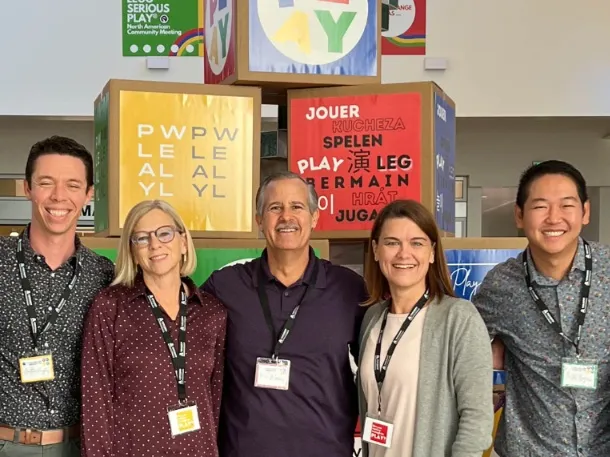- Home
- >
- APU Articles
- >
- News Article
Learning from LEGO®: LEGO® SERIOUS PLAY® North American Community Meeting
December 15, 2022 | Category Business | Written By Kyra Palmbush

Using colorful bricks in work contexts has grown as an ongoing phenomenon as business professionals embrace creativity to spark conversations, improve communication, and brainstorm innovative ideas. Curtis Isozaki, MA, CF-LSP, the director of strategic initiatives and enrollment at the Honors College and adjunct professor in the Department of Leadership and Organizational Psychology, explained the benefits of using LEGO®. “LEGO® SERIOUS PLAY® is an opportunity for organizations to have 100 percent engagement and 100 percent participation by playing with a purpose. LEGO® bricks are used as a median and utilize metaphors to understand systems, strategies, and people in the room,” he said. “It is one of the most powerful tools organizations can use for transformation.” After working at LEGOLAND for 11 years, McGehee was a pioneer in LSP and an influential figure in bringing the practice to APU. McGehee explained, “My research is centered around helping organizational leaders to think differently about solving challenges. There are a lot of linear thinkers, especially in the business world. LEGO® helps look at problems and challenges from a different perspective.”
LSP originated in Denmark as an internal product for LEGO®. It was created to help strategy development and expanded to become a tool used by organizations, institutions, and individuals in all areas of expertise. Every year, there is a global conference in Denmark, but to make the tools more accessible, they have included localized conferences around the globe, including North America. “Hosting the conference was a nod and an honor to APU,” McGehee said. “The work we are doing here with our research and bringing it into the classroom has been noticed by many across the country.”
The conference spanned three days and included building training, skills training, keynote sessions, and presentations from facilitators. LSP Facilitators from Canada, Mexico, Denmark, the Netherlands, Brazil, and Peru were in attendance. “The conference is intended to be a place for certified LSP Facilitators to gather, share research, best practices, and talk through new trends that might be happening within using the method,” McGehee said. Robert Rasmussen, one of the co-founders of LSP, was in attendance and explained that “geographical diversity with facilitators joining not only from the US and Canada but also from Europe as well as Central and South America was a highlight of the conference.” LSP Facilitators come from a variety of backgrounds and contexts. McGehee explained, “There were elementary educators, therapists who use LEGO® for play therapy, and business consultants. It was a unique group that came together to talk about how they are using LEGO® and learn from each other.”
The conference was a success with many notable moments. Participants were encouraged to create simple guiding principles to remember and implement the wisdom from LEGO® in a digestible way. “My simple guiding principle was, build upon before building out,” Isozaki said. “The conference truly showed the power of community. It was incredible to see like-minded, like-hearted colleagues, professionals, and friends unified together with a common idea or philosophy.” Per Kristiansen, co-founder of LSP alongside Rasmussen, explained his impression of the conference was defined by its energy. He described the environment as encompassing “The willingness to share, trust in each other, sort of an optimism, and the wish to make things better.”
Participants had the opportunity to share their research and expertise with the group. Isozaki presented about cultural intelligence. “My keynote was ‘Becoming Culturally Aware to Facilitate Group Dynamics.’ It covered three tools: cultural intelligence, the cultural proficiency continuum, and cultural mapping.”
As a community that embraced play, the meeting was structured with a balance of seriousness, academic content, and fun. “To introduce the participants to the US and Southern California culture, all 50 of us walked to In-N-Out Burger, wearing hats and embracing a playful spirit,” McGehee said. The participants also gathered for shared dining experiences in Wilden Hall. “The School of Business did an amazing job curating various tables and had a jazz ensemble playing the entire evening,” said Isozaki.
Each summer, APU provides a four-day intensive training for LEGO® SERIOUS PLAY® Certification. “We have been training people in the LSP method here at APU since 2018,” McGehee said. We have now trained almost 60 facilitators and are continuing to build our team of certified trainers here at APU that we can use to help support organizations thinking differently.” Isozaki and McGehee hope LSP can be part of the experience for all individuals at APU and beyond. Isozaki said, “ Everyone has creative capacity, can build, and has a voice to contribute to strategies, systems, and well-being of their organization.”